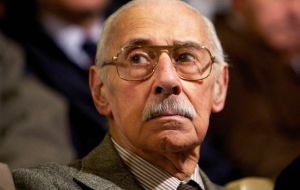MercoPress. South Atlantic News Agency
Argentine ex-military dictator sentenced to life, Jorge Videla dies in jail cell
 The unrepentant dictator said “war, by nature, is cruel” and ”an internal war, between brothers, is especially cruel”.
The unrepentant dictator said “war, by nature, is cruel” and ”an internal war, between brothers, is especially cruel”. Jorge Rafael Videla, a former army commander who led Argentina during the bloodiest period of a “dirty war” dictatorship and was unrepentant about kidnappings and murders ordered by the state, died on Friday at age 87.
Videla was the first president to head the military junta that “disappeared” thousands of suspected leftists from 1976 to 1983, and he spent his final years behind bars for human rights crimes, including the systematic theft of babies born to political prisoners in secret torture centres.
He died of natural causes in his jail cell in a prison located in Marcos Paz, outside the capital, Buenos Aires.
Rights groups say up to 30,000 people were “disappeared” - a euphemism for kidnapped and murdered - during the dictatorship, which began in March 1976 when Videla and two other military leaders staged a coup against President Maria Estela Martinez de Peron, the widow of former leader Juan Domingo Peron.
Argentina's guerrilla groups such as the Montoneros had been weakened by the time Videla came to power. He targeted union organizers, students, journalists and anyone else perceived to be associated with communism and atheism.
Last year Videla told an Argentine journalist that the crackdown he oversaw was the price that Argentina had to pay in order to remain a republic.
“War, by nature, is cruel” Videla said. “An internal war, between brothers, is especially cruel”.
Videla was born in the town of Mercedes to a middle-class family in 1925. He followed in the footsteps of his father, an army colonel, enlisting in the military academy where he was well-respected.
Following the coup of 1976, Videla headed a three-man military junta and he led the country until 1981.
The junta pledged to end left-wing subversion, put the economy in order and respect human rights. Videla said several times that the aim of his government was to return Argentina to democracy.
However, he conditioned that on the ”Process of National Reorganization,“ in which the military planned to foster sweeping reforms to reduce the state's role in the economy and rid Argentina of the influence of former strongman Perón.
He quickly suspended the normal functions of Congress, local government and the Supreme Court, and oversaw the worst excesses against those suspected of left-wing activities.
It was also the government of ”sweet money“ when Argentines briefly enjoyed the benefits of the monetarist policies of Economy Minister Jose Martinez de Hoz. He did away with import tariffs and re-valued the peso against the US dollar, helping Argentina build up a $50 billion foreign debt.
When Videla was succeeded by army chief Roberto Eduardo Viola in 1981, the political balance inside the armed forces began to crumble but Argentina was still deeply entrenched in military rule. It remained so until the catastrophe of the Malvinas War against Britain in 1982 eroded the military's power.
Only four years after leaving Argentina's presidential palace, with the democratically elected government of President Raúl Alfonsín in office, Videla was sentenced to life in prison for human rights abuses under his rule.
He spent just five years behind bars because of a pardon granted in 1990 by then-President Carlos Menem. But eight years later, a judge scrapped the pardon.
More ”dirty war“ cases were opened in Argentina during the 2003-2007 Presidency of Nestor Kirchner and in subsequent years, and Videla was given several life sentences.
During a trial in 2012, Videla was sentenced to 50 years in prison for being the architect of a systematic plan to steal babies from prisoners at clandestine detention centres.
An unrepentant Videla described himself as a ”political prisoner“ during the trial.
”The women giving birth, who I respect as mothers, were militants who were active in the machine of terror,“ the former dictator said in his closing remarks. ”Many used their unborn children as human shields.”
Commenting on the death of Videla, the head of the Grandmothers of Plaza de Mayo human rights association, Estela de Carlotto said that “a despicable being has left this world”.
“History will assess the genocide and the disgrace of the civic and military dictatorship he commanded and which he never regretted”.
“He was already judged and condemned here” De Carlotto told a radio program in Buenos Aires, and although he was a Catholic, “he will not go to heaven” because “no matter what the man says on Earth, God will speak differently.”
“There are good men and bad men. He was a bad man,” she concluded.




Top Comments
Disclaimer & comment rules-

-

-

Read all commentsSay what you like about him, but I was a big fan of his kitchen cleaning products
May 17th, 2013 - 06:22 pm 0http://www.vileda.co.uk/uk
memento mori
May 17th, 2013 - 06:25 pm 0Q.E.P.D Mi General !!
May 17th, 2013 - 06:50 pm 0Commenting for this story is now closed.
If you have a Facebook account, become a fan and comment on our Facebook Page!